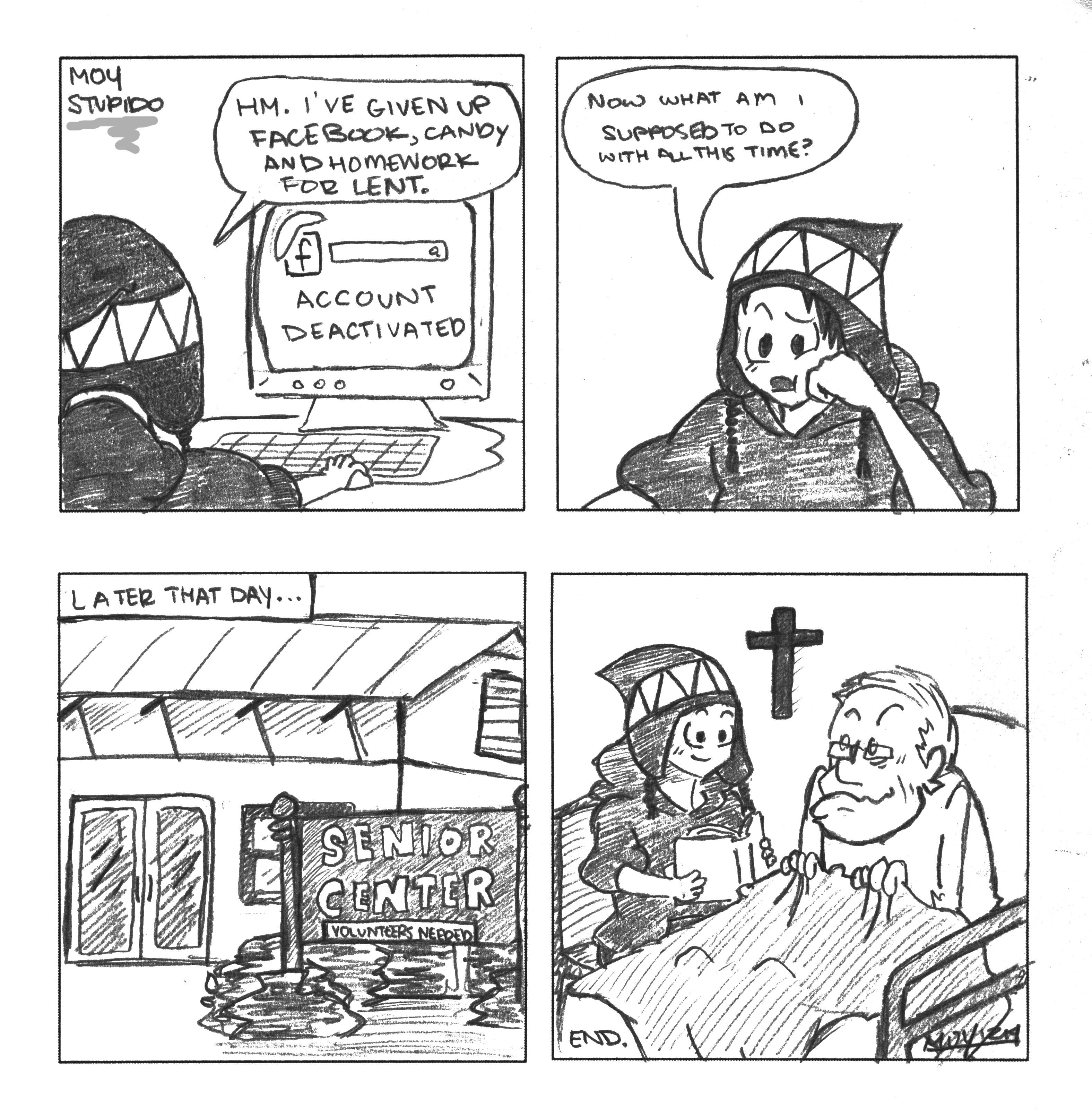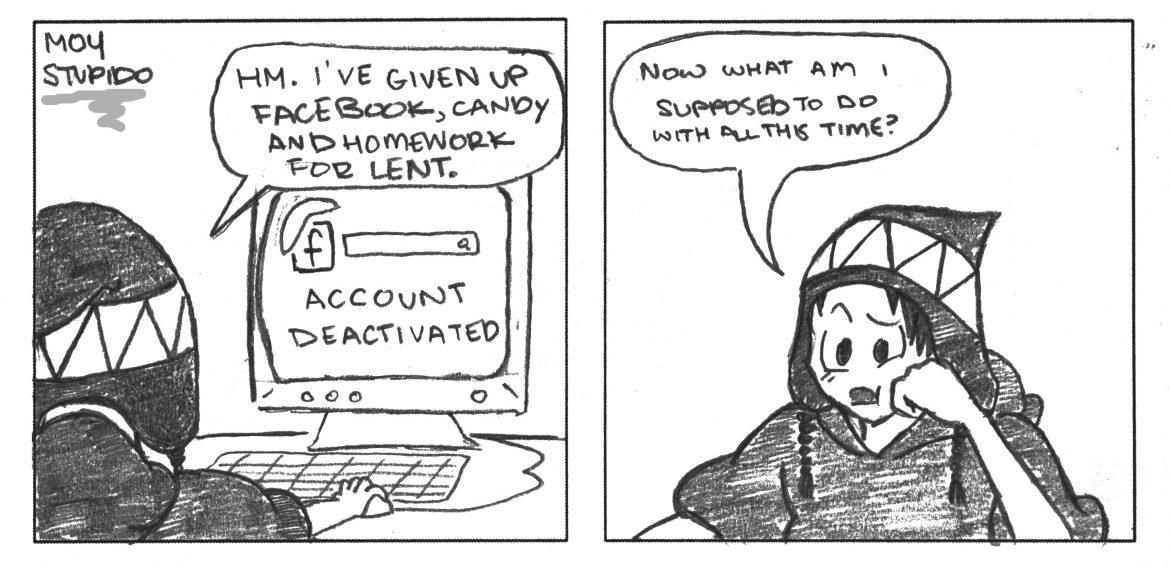
For many, the purpose of Lent, Ramadan and Yom Kippur is to sacrifice personal desires to develop a closer bond with God and personal faith. This time of the year represents a time for confession, repentance, prayer, fasting and abstinence.
Ramadan signifies the time of spiritual reflection of one’s relationship with God and marks the day of Resurrection or the Day of Judgment. Muslims pray for the ninth month of the Islamic calendar, Ramadan and fast from sunrise to sunset for 30 days. During the fasting, Muslims recite the Quran and are required to be completely honest and pray five times a day following the guidance of Allah. Once judgment day comes, believers will be rewarded for fasting and praying and have all previous sins forgiven, according to muslimmatters.org.
Each time they pray they have to cleanse their bodies and wash their face before facing Mecca, the
Lenena Vargas, 18, freshman screenwriting major prays about three to four times a day, throughout Ramadan and abstains from drinking food or any liquids from sunrise to sunset. Vargas also has given money to the homeless any time she gets the chance to.
“At the month of Ramadan, Muslims give a certain amount of their money to the poor so they won’t be hungry and in need while they’re having a good life,” Vargas said. “In honor of their religion and beliefs, they believe that if they have enough money even if they don’t, they should share it with the poor. They put time for charity to help people in need.”
People pray during the month of Ramadan because of his death and sacrifice, Vargas said.
Yom Kippur is a Jewish holiday known as the holiest day of the year and completes the annual period known in Judaism as Rosh Hashanah. Rosh Hashanah, the Jewish new year.
Traditional practices also include fasting and praying for a 25-hour period before sunrise on the day of Rosh Hashanah. Many Jews will also abstain from work during the holiday, according to the Christian Broadcasting Network.
Yom Kippur is recognized as the Day of Atonement, which emphasizes the reconciliation between individuals, people and God to make peace and amends by asking for forgiveness of sins. The ten days of repentance follow Yom Kippur’s course that holds five prayer services including the confessions of sins eight times following Yom Kippur, according to the article.
The Jewish tradition of Yom Kippur highlights the day when God decides the fate of each individual and cleanses their faith by purifying the soul of any sins. Yom Kippur took place after the Israelites’ exodus from Egypt and arrival at Mount Sinai, where God gave Moses the Ten commandments signifying the atonement of Israelites sins. Moses stayed there fasting for 40 days and 40 nights with God in the wilderness before he began his public ministry, according to history.com
Nancy Serrano, 19, sophomore criminal justice major follows the holiday and say’s she has made amends with her close friend before the Day of Atonement in order to start fresh for the next following year and prepare on improving her relationship with others and with God.
“I used my friends iPhone and it fell on the ground and broke. I felt terrible and offered to fix it, which took a while to gather the money,” Serrano said. “Eventually I found a repair shop that fixes screens. I felt like the fact that I cared and took the initiative to fix it brought our friendship even closer together and built a bond of trust. This also increased my spiritual connection with God.”
Lent is the Christian season of the preparation before Easter remembering the resurrection of Jesus Christ. The season takes a 40-day period of fasting, repentance and spiritual reflection of Jesus Christ life, death, sufferings and resurrection. Traditional practices include holy week Church services that follow Jesus Christ’s time during his ministry, according to catholiceducation.org.
Melissa Montecuollo, 26, decided to abstain from alcohol while her friend Jenel Bloom, 21, gave up chocolate for Lent this year.
“Alcohol was probably the biggest one,” said Montecuollo, CSUN alumna who graduated with a bachelor’s degree in English. “It was something I just found I hold on to too much.”
Montecuollo and Bloom are both Christians and met four years ago on campus at CSUN’s Intervarsity Matador Christian Fellowship (IMCF), a multicultural and non-profit organization. IMCF is a chapter of more than 500 Intervarsity Christian Fellowships. They are a club that has no denominational or church ties.
Bloom said she has observed Lent for the past two years and plans to understand it more.
“My junior year in high school, I gave up chocolate and I totally failed,” said Bloom, senior kinesiology major. “It wasn’t that I was craving chocolate, I just forgot over and over. (The) next year, I gave up soda and did much better.”
Lent starts with the marking of Ash Wednesday, which this year started on March 5. Not counting Sundays, this takes place 40 days before Easter.
“The time frame of Lent is modeled after the time Jesus goes into the wilderness and fasts before his ministry for a 40-day period where he is tested by Satan and overcomes him,” Montecuollo said. “That’s why Lent is 40 days before Easter.”
Growing up, Montecuollo did not practice Lent, but attended a Good Friday service.
“What I like about Lent is the way it builds strong discipline,” Montecuollo said. “You’re working up to developing a stronger and solidified relationship with the Lord in the process of sacrificing something.”
Bloom said she plans to add and develop reading as a Bible study tool. She said it is more about learning the lessons than it is about succeeding.
“During this Lent season I added reading the Bible everyday and taking time out of my day to read through more chapters,” Bloom said. “That’s my way to observe Lent and remember the entire process of Jesus going through the wilderness.”
Many Catholics as well as different Christian denominations, such as Orthodoxes, Protestants and Evangelicals celebrate Lent.
“A lot of Christians think Lent is only a Catholic tradition and it’s not,” Montecuollo said. “It’s a Christian Evangelical faith practice anyone can participate in and enjoy.”
Leslie Chavarria, 22, senior deaf studies major, said she does not participate in Lent, but makes personal sacrifices and prays in order to develop a closer relationship with God.
“There have been times where I’ve fasted from food for three days,” Chavarria said. “For a whole day, I would only drink water. One time I fasted from meat for six months and I’ve fasted from social media three times a week. It’s always something that I’m going through with my relationship with God.”
Montecuollo said the hardest part of Lent was giving up certain luxuries.
“The biggest thing I’ve given up for Lent is the entitlement to have stuff,” Montecuollo said. “(Feeling like) we deserve to drink alcohol because we are 21 and it’s legal or we deserve to have chocolate because it was a hard day. Giving up the entitlements is a big thing.”
